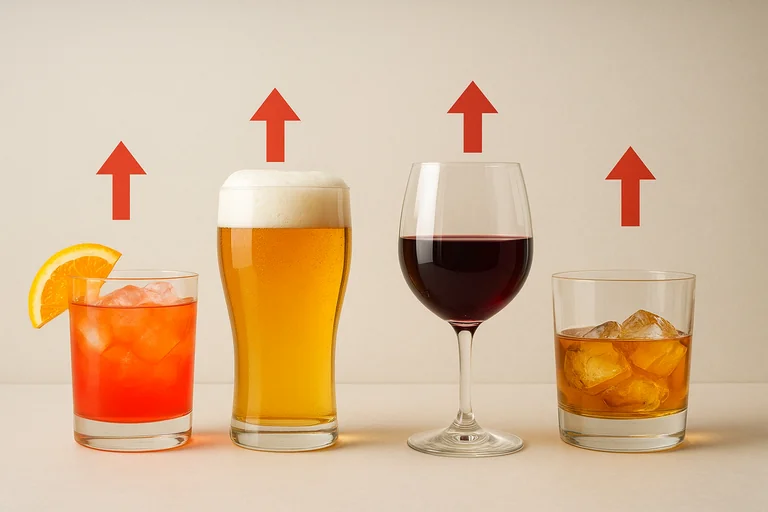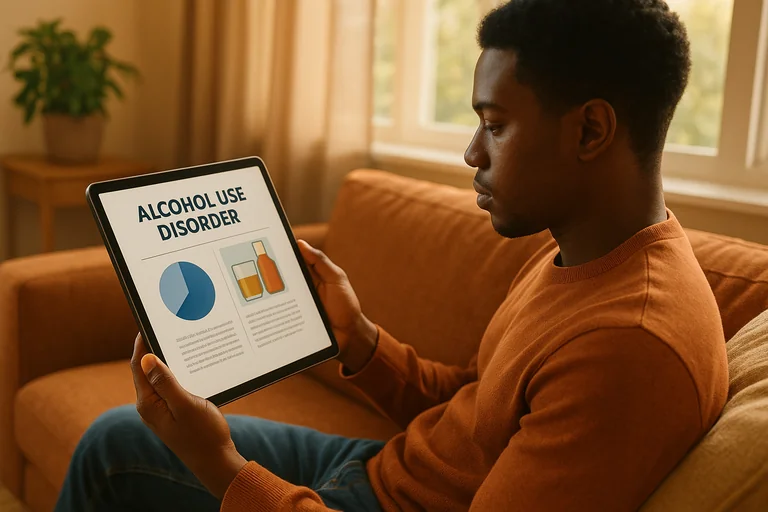A 2 minute assessment to get a personalized mental health or alcohol recovery plan.
You've made it through the first weekend. You've navigated the social pressures and the evening cravings. You've hit the two-week mark of your alcohol-free journey. It's a significant milestone, and whether you're feeling a dramatic shift or just subtle changes, your body and mind are already thanking you.
What You'll Discover:
- What to expect during your first two weeks without alcohol
- Steps to take to maximize the healing benefits during this crucial period
- The importance of understanding the science behind rapid physical and mental improvements
The idea of taking a two-week break from alcohol may seem short to some people, but it's actually been proven to create significant health improvements in just this timeframe. When traditional approaches to "drinking less" fail repeatedly, causing ongoing health concerns and diminished quality of life, many people assume they need months or years to see real benefits from sobriety. With modern understanding of liver regeneration, sleep improvement and other rapid healing processes now available, it's actually very straightforward to experience meaningful health changes in just fourteen days.
So, how do two weeks without alcohol create such dramatic improvements exactly? It's actually much more powerful than you think with multiple body systems involved in the healing process.
Do Your Research About Short-Term Sobriety Benefits
Before you begin taking steps to complete a two-week alcohol break, it's important to learn about the rapid healing that occurs when you stop drinking. In particular you want to look up information on:
- How quickly your liver begins to regenerate and reduce inflammation
- What chronic alcohol consumption does to disrupt your sleep and metabolism
- Why even short periods of sobriety create measurable health improvements
Medical improvements are triggered by different timelines, and alcohol recovery is the perfect example. It's not just for people with severe alcohol use disorder who need long-term treatment programs. It's also appropriate for people who want to understand how even moderate regular drinking affects their health and what benefits they can expect from a break.
No matter what your drinking pattern, it's always best to know as much as you can about the healing timeline before starting your alcohol-free period.
Choose to Maximize Your Healing Potential
The next part takes intentional health support as well. You'll need to understand how to optimize your body's natural healing processes during these crucial first two weeks of sobriety. This is an extremely important opportunity that goes well beyond just not drinking.
You'll want to make sure that you understand how to support liver regeneration, improve sleep quality, and enhance mental clarity to ensure you get maximum benefit from your alcohol-free period. Experience with sobriety support is also extremely important. Healthcare providers who have been helping people through alcohol breaks for years and specialize in addiction recovery are going to be well-equipped to help with strategies for optimizing your healing.
Take an Assessment of Your Starting Point
The approach you choose should help you document your baseline health markers before starting your two-week break. This is a crucial part of the process for understanding and tracking the improvements you'll experience.
This assessment is a simple yet crucial part of the process for determining what specific benefits you can expect and how to measure your progress. It also provides you with baseline information that will be important for staying motivated throughout the two weeks.
Choose the Right Support Strategies
If you're committed to completing two weeks without alcohol you can develop a plan that maximizes your healing potential during this period. With evidence-based health approaches there are several proven strategies that all include different techniques for supporting rapid recovery and maintaining motivation.
Have Your Health Optimization Plan
The most essential step in maximizing your two-week alcohol break is implementing strategies that support your body's natural healing processes. Your plan will include:
- Optimizing hydration and nutrition to support liver regeneration
- Establishing sleep hygiene practices to restore natural rest cycles
- Incorporating gentle movement and stress reduction techniques
This will help ensure you experience the full range of benefits possible during your alcohol-free period and set the foundation for continued improvements if you choose to extend your break.
Begin Implementing Healing Support Strategies
After establishing your plan, you'll start following evidence-based approaches to maximize your recovery during these crucial two weeks. This includes nutrition protocols, sleep optimization, and stress management techniques that support your body's healing processes.
The strategies focus on accelerating the natural benefits that occur when you stop drinking while making the experience as comfortable and rewarding as possible. It's extremely important to follow these approaches consistently, especially when it comes to sleep hygiene and hydration that directly affect how quickly you heal.
Take the Physical Changes Seriously
Once you begin experiencing the rapid improvements that occur during alcohol-free periods you can start appreciating how much alcohol was affecting your daily well-being. There will be noticeable changes in energy levels, sleep quality, skin appearance, and mental clarity that demonstrate alcohol's impact.
It's extremely important to pay attention to these changes exactly as they occur, particularly when it comes to sleep improvement and mental clarity that happen quickly when alcohol is removed.
Follow-Up to Build Long-Term Momentum
Having strategies to extend and build upon the benefits you experience during your two-week break is highly beneficial in creating lasting health improvements. It gives you the opportunity to assess whether continuing alcohol-free or significantly reducing consumption aligns with your health goals.
This evaluation can also help you understand whether professional support might be helpful for maintaining the improvements you've experienced during your alcohol break.
Why Your Body Works Against You When You Drink Regularly
Don't let outdated ideas about alcohol being harmless in moderation fool you into thinking that regular drinking doesn't significantly impact your health and recovery capacity. The criteria for what makes even moderate alcohol consumption disruptive to your body's natural functions is clear based on extensive research.
Many sleep specialists, liver experts and recovery physicians will tell you that alcohol affects multiple body systems in ways that compound over time. Even people who drink moderately can experience dramatic improvements when they stop, and it's particularly noticeable because chronic alcohol consumption disrupts so many fundamental processes like sleep, liver function, and brain chemistry.
Now that you have a better idea of what's happening in your body when you remove alcohol, let's delve further into the specific improvements you can expect during your first two weeks and why they happen so quickly.
The Undeniable Truth About Rapid Alcohol Recovery
The undeniable truth is that your body begins healing immediately when you stop drinking, and many benefits become noticeable within just two weeks. As Hotel California by the Sea explains, alcohol disrupts your natural sleep cycle and when you stop drinking, your body can quickly restore more restful sleep patterns.
Sleep Quality Transformation
One of the most immediate and dramatic improvements you'll experience is better sleep. While alcohol might make you feel drowsy initially, it severely disrupts your natural sleep cycles, causing fragmented, poor-quality rest.
Alcohol prevents you from reaching the deeper, restorative stages of sleep and causes you to wake up frequently during the night. After two weeks without alcohol, you'll likely find yourself falling asleep more easily, staying asleep longer, and waking up feeling genuinely refreshed and energized.
This sleep improvement creates a positive cascade effect - better rest leads to improved mood, clearer thinking, and more physical energy throughout your day.
Liver Regeneration and Healing
Your liver bears the brunt of alcohol processing, and chronic drinking causes inflammation and fat accumulation in liver tissue. The remarkable news is that your liver has extraordinary regenerative capacity.
After just two weeks of abstinence, your liver begins reducing inflammation and shedding excess fat deposits. This improved liver function enhances your body's ability to process toxins, regulate blood sugar, and produce essential proteins.
You may notice improved digestion, more stable energy levels, and reduced bloating as your liver function improves during this period.
Skin Health and Appearance
Alcohol dehydrates your entire body, including your skin, leading to a dull, dry complexion and more prominent fine lines. Alcohol also triggers inflammatory responses that can cause redness and irritation.
After two weeks without alcohol, you'll likely notice your skin looks brighter, clearer, and more hydrated. The improved sleep quality also contributes to better skin appearance, as your body repairs and regenerates skin cells more effectively during quality rest.
Mental Clarity and Emotional Stability
Alcohol significantly impacts brain chemistry, affecting neurotransmitters that regulate mood, anxiety, and cognitive function. Even moderate drinking can create a cycle of artificial highs followed by depressive lows.
After two weeks without alcohol, you'll likely experience improved mental clarity, reduced anxiety, and more stable moods. The "brain fog" that many people don't even realize they're experiencing lifts, leading to better concentration and decision-making abilities.
NEED TO KNOW: These improvements in sleep, liver function, skin health, and mental clarity typically begin within days and become clearly noticeable by the two-week mark. They represent your body's natural healing capacity when alcohol is removed.
What's Most Concerning About Alcohol's Hidden Impact
What's most concerning about regular alcohol consumption is how it creates a "new normal" where people forget what optimal health feels like. Many people don't realize how much alcohol was affecting their sleep, energy, and mental clarity until they experience life without it.
The Dehydration and Nutrient Depletion Cycle
Alcohol acts as a diuretic, causing significant fluid and electrolyte loss that affects every body system. It also interferes with nutrient absorption and depletes essential vitamins and minerals.
After two weeks without alcohol, proper hydration is restored and your body can more effectively absorb and utilize nutrients from food. This contributes to improved energy levels, better immune function, and enhanced recovery from physical activity.
Weight and Metabolism Improvements
Alcohol contains empty calories that contribute to weight gain, particularly around the midsection. A single glass of wine contains up to 150 calories, and a pint of beer can exceed 200 calories.
Beyond the caloric impact, alcohol disrupts metabolic processes and blood sugar regulation. After two weeks without alcohol, many people notice weight loss and improved energy as their metabolism normalizes and they're not consuming hundreds of empty calories weekly.
Immune System Recovery
Chronic alcohol consumption suppresses immune function, making you more susceptible to infections and slower to recover from illness. This immune suppression can be significant even with moderate drinking.
After two weeks without alcohol, your immune system begins recovering its full protective capacity, making you better equipped to fight off infections and maintain overall health.
Navigating the Challenges of Your Two-Week Break
While the benefits of two weeks without alcohol are substantial, it's important to acknowledge that this period can present challenges, especially if alcohol has been a regular part of your routine.
Managing Social Situations
If your social life has revolved around drinking, the first two weeks can require some adjustment. You may need to navigate social events differently or find new ways to connect with friends.
This challenge often becomes an opportunity to discover that you can enjoy social situations without alcohol and may even prefer the authentic connections that develop when you're fully present.
Dealing with Cravings and Habits
Evening cravings or the urge to drink during your usual times can be challenging initially. Having alternative activities ready - like herbal tea, a walk, or a hobby - can help you navigate these moments successfully.
Many people find that cravings decrease significantly after the first week as new habits form and the physical benefits become more apparent.
Processing Emotions Without Alcohol
If you've been using alcohol to manage stress or difficult emotions, you may need to develop new coping strategies. This is actually a valuable opportunity to build healthier emotional regulation skills.
Consider techniques like deep breathing, journaling, gentle exercise, or talking with supportive friends or family members when challenging emotions arise.
Building Momentum for Long-Term Success
Two weeks without alcohol provides powerful evidence of your body's healing capacity and can serve as a foundation for longer-term health improvements. Many people find this period so beneficial that they choose to extend their alcohol-free time or significantly reduce their consumption going forward.
The key is recognizing that the improvements you experience during these two weeks represent just the beginning of what's possible with continued sobriety or reduced alcohol consumption.
If you're finding the two-week break challenging to maintain or want to explore longer-term changes to your drinking patterns, professional support can help you build on the momentum you've created.
Modern treatments like naltrexone can make it easier to reduce or eliminate alcohol consumption by blocking the reinforcing effects of drinking, allowing you to maintain the health benefits you've discovered during your alcohol-free period.
Whether you're celebrating the completion of your two-week break or considering extending it further, take our Alcohol Use Assessment to explore how professional support can help you maintain and build upon the positive changes you've experienced.




